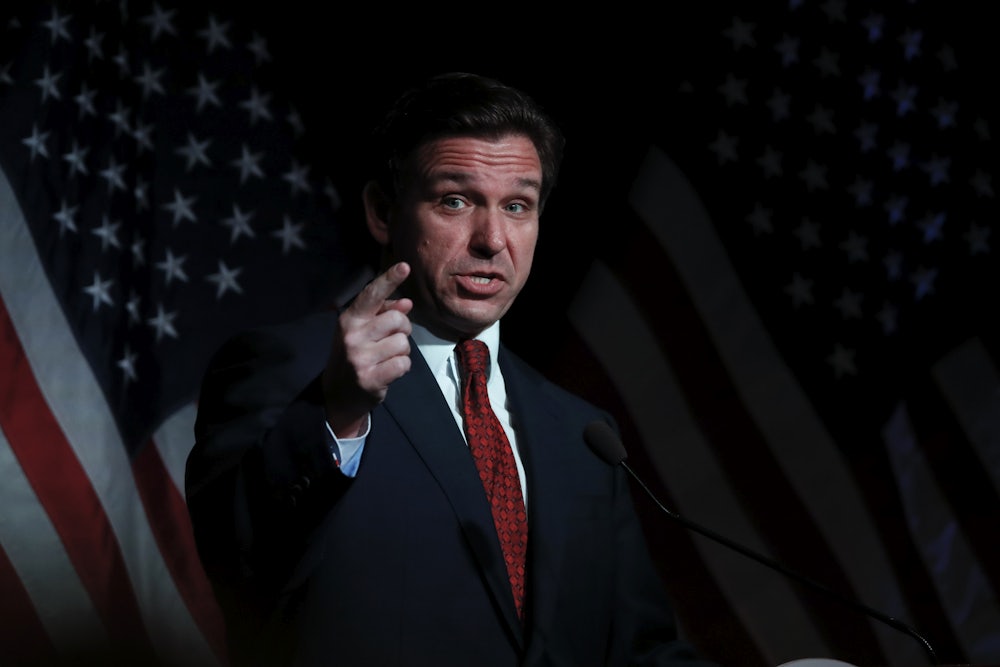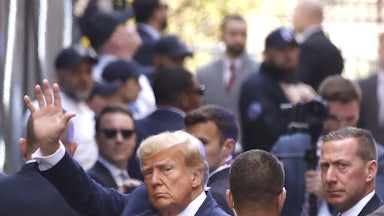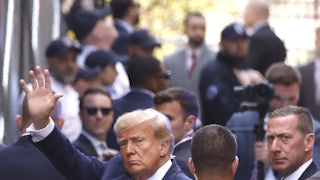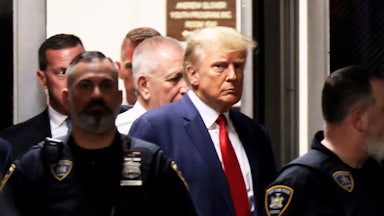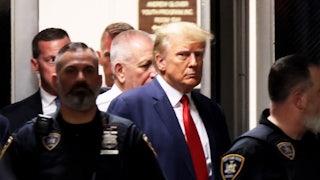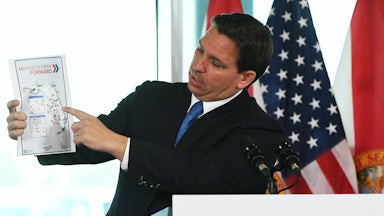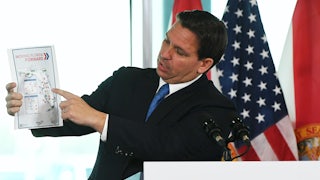There was a time, not long ago, when a rhetorical slip could sink a presidential campaign. Whether that remains true in the post-Trump world is now being put to the test by Republican candidate Ron DeSantis’s batshit-crazy comments about the Federal Reserve at a conservative event this past weekend, wherein the Florida governor proposed that states band together to fight a (nonexistent) Fed plan to restrict how much gas you can put in your car and how many guns you can own. Before we dive into those, though, let’s review some history.
In 1967, Michigan Governor George Romney told an interviewer that he briefly supported the Vietnam War because American generals in Vietnam subjected him to “the greatest brainwashing that anybody can get.” His campaign for the Republican nomination went up in smoke.
In 2012 Romney’s son, Mitt Romney, said the 47 percent of the electorate who didn’t pay income tax would vote to reelect President Barack Obama because they “believe that they are entitled to health care, to food, to housing, to you name it.” That contemptuous remark may have cost Romney fils the election.
In 2016 Hillary Clinton said half of Trump voters were “racist, sexist, homophobic, xenophobic, Islamophobic—you name it,” and called them a “basket of deplorables.” In retrospect, the only fault in Clinton’s comment was that she set the percentage too low; a 2022 poll suggested the basket was more like 60 percent (assuming you think, as I do, that belief in the “great replacement” conspiracy sorts you into said basket). The actual context of Clinton’s remarks was to urge supporters to “understand and empathize with” the other half of Trump’s supporters, “who feel that government has let them down, nobody cares about them, nobody worries about what happens to their lives and their futures, and they are just desperate for change.” It was an exceptional expression of kindness toward people who couldn’t stand her. It didn’t matter. That quote may have cost her the election.
The winner in 2016 was Donald Trump, who spewed so much crazy and/or hateful rhetoric, during the campaign and after, that he may have rendered the political gaffe extinct. If so, there are some benefits. Former New Republic editor Michael Kinsley famously observed, “A ‘gaffe’ is the opposite of a ‘lie’: it’s when a politician inadvertently tells the truth.” But that covers only some cases, like Romney père’s brainwashing metaphor and Hillary Clinton’s hamper. Today these are often described as Kinsley gaffes. In many instances, though, a gaffe is genuinely appalling.
Trump’s gaffes weren’t Kinsley gaffes, except in the attenuated sense that they revealed truths about Trump. They were ugly and ignorant and idiotic, and although they probably had some cumulative impact in denying Trump reelection in 2020, they improved his standing with the Republican base. To quote a thoughtful New York Times Magazine essay published in 2016 by Charles Homans, Trump “opened the door to a post-gaffe politics, stripping away the convenient fiction of missteps and errors that journalists turn to when they are uncomfortable confronting a statement on its merits.” As president, Trump challenged reporters to confront his statements (and actions) on their merits. The results were mixed.
We now have before us DeSantis’s gaffe. It’s too early to tell how much coverage it will receive; I found out about it from a colleague, who spotted a tweet by Washington Post columnist Catherine Rampell, who correctly identified it as “insane.” I’m going to quote DeSantis at great length to provide maximum context. He uttered these words (43:06–44:30) in remarks delivered April 1 to the Pennsylvania Leadership Conference.
One of the things we’re gonna ban in Florida this year is the idea of a Central Bank Digital Currency that they’re trying to do. [Applause.] This is something where they want the Fed to control a digital dollar. And guess what’ll happen? They’re gonna to try and impose an ESG agenda through that. You go and use too much gas, they’re gonna stop it, they’re not going to honor the transaction because you’ve already bought more than what they think. You want to go buy a rifle they’re gonna say no, you have too many of those, you can’t do it.
So it’s ceding the power of our financial freedom to a central bank which does not have our interest at heart. So I think all states need to band together, need to say we’re not doing this Central Bank Digital Currency. We’re gonna let you be in charge of your own finances. What we have seen, whether it is education, whether it’s the bureaucracy, whether it’s corporate America, is there is a left-wing agenda that is being imposed on our society, and in Florida, we just said no. We said we recognize this as a threat across the board and we pledged to fight the woke in the schools, we pledged to fight the woke in the corporations, we pledged to fight the woke in the halls of the legislature. Florida will never, ever surrender to the woke mob because our state is where woke goes to die.
You’re probably wondering what on earth DeSantis is talking about. Central Bank Digital Currency, or CBDC, is a proposal that the Fed and the Treasury Department are considering. China already has it. The Fed says it “has made no decisions” on whether to pursue the idea.*
What the Fed and Treasury contemplate, according to a January 2022 paper, is a digital currency issued by the Fed in addition to the physical dollars that are already issued by the Fed, to enhance liquidity for households and entrepreneurs. Unlike, say, Bitcoin, this digital currency would be backed by the government, so it would not pose the same safety risks. DeSantis frames his opposition to sound like he opposes cryptocurrency, but CBDC is actually an effort to displace cryptocurrency with something more stable. “A CBDC would be the safest digital asset available to the general public,” the Fed paper said, “with no associated credit or liquidity risk.” The Fed would issue the currency, but private banks and regulated nonbank financial service providers would distribute it, as they do now with paper currency.
There might be potential downsides. It would entail at least some disruption to commercial banks and Wall Street. But there is no chance the Fed will move forward unless the financial sector—or anyway, the part that excludes cryptocurrency peddlers—gives its assent. The Silicon Valley Bank collapse possibly put CBDCs on the Fed’s back burner as it comes to terms with a banking system that was more fragile than it previously supposed. Alternatively, it may have increased the Fed’s desire to give bankers a source of money that wouldn’t be susceptible to a bank run.
There are some privacy worries, but they don’t resemble what DeSantis describes. Bank transfers are easily traceable today, after all, even without CBDCs. Payments made in cash are not, but large purchases in cash are necessary only to terrorists and criminals. That CBDCs might inconvenience these sociopaths is not a minus but a plus. Cybersecurity would be a concern, but it’s already a concern for commercial banks.
The Fed scheme DeSantis described in his remarks is sheer fantasy. He imagines that the Fed would use CBDCs to steer purchases in the direction of environmental protection, social justice, and corporate governance. There’s nothing in the CBDC plan that would enable the government to do that. Nor could it limit gasoline purchases or prevent anybody from buying a gun. We have entered the realm of John Birch Society–grade nuttery, akin to the Birchers’ claim in the 1950s that water fluoridation was a Communist plot to control American minds. Even Barry Goldwater tried to distance himself from the Birchers (unpersuasively) when he ran for president.
In the political culture that predated Donald Trump, a comment like DeSantis’s would end a presidential campaign for a few reasons. First, this rant is paranoid and unhinged. Second, bankers, who have a stake in this proposal receiving reasonable consideration, are a Republican constituency sitting on huge piles of cash. They may not be as Republican as they used to be, but Republicanism is still the prevailing religion in that sector, and these comments will hurt DeSantis with them. Third, in emitting this bizarre screed against CBDC, DeSantis is effectively running interference for the cryptocurrency industry, as disreputable a bunch as can be found in the financial marketplace. (See Bankman-Fried, Sam.) Fourth, it makes DeSantis sound like, well, General Jack D. Ripper expounding on fluoridation in Dr. Strangelove.
So far, though, DeSantis’s remarks have attracted little attention. They haven’t even gotten much attention in Florida; the Miami Herald ran a piece today about DeSantis demagoguing the Fed, but didn’t mention this rant. Of course, DeSantis rants about a lot of things: immigration, “critical race theory” (whatever he imagines that to be), gender identity, immunization, the whole culture-war horn of plenty. A lot of what he says on those topics is made up. But this, it seems to me, elevates his nuttery to a new plane. He’s already reached into the Walt Disney Company’s wallet spouting conspiracy theories. Now he’s reaching into your wallet.
DeSantis introduced legislation on March 20 prohibiting the use of CBDC in Florida, something Florida probably doesn’t even have the power to do. Jimmy Patronis, the state’s chief financial officer, issued a statement that same day in support of DeSantis’s plan, spouting similar gibberish. Republican Senator Ted Cruz introduced a bill late last month banning CBDCs, making it a bit clearer than DeSantis did that he’s on the side of Bitcoin and other speculative cybercurrencies. On the Democratic side, anti-vaxxer Robert F. Kennedy Jr., who just filed papers to challenge President Joe Biden in the primaries, gave us some flavor of his fledgling campaign in a tweet that said CBDCs “grease the slippery slope to financial slavery and political tyranny.”
DeSantis’s conspiratorial babble about the Fed was no rhetorical slip, and he isn’t going to get shut down by the Republican mainstream because there isn’t one anymore. DeSantis is trying to start a movement. He may succeed.
* This article has been updated to remove an erroneous parenthetical about a forthcoming Fed program called FedNow, which is an instant payments service that does not involve digital currency.
